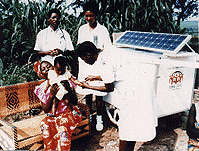|
�Project
background and methodology
|
|
Direct
access to electricity in the household can bring numerous benefits.
However, wider access to the benefits of electricity, particularly for
the poor, can be achieved through electricity connections for institutions
and local enterprises. For example, local businesses can stimulate local
economies, increase the value added to local production, create employment,
and provide local governments with new revenue sources to provide improved
public services. Electrification for institutions, such as hospitals
and schools, can bring the education and health benefits of electricity
to all members of a community.� |
 electricity for vaccine refrigeration |
The PACE project activities and timing are summarised below:
| Activity | Description | Timetable |
|
Country Assessments
and Case Studies |
Following
countrywide assessments of electricity and PPPs in Ethiopia,
Nepal, Sri Lanka and Uganda, PACE
will examine samples of different PPPs in each country. The team will
then develop case studies that will cover a broad range of issues, including
private sector trust, institutional capacity, levels of access, service
satisfaction and quality and tariffs and pricing arrangements.
The purpose of the case studies will be to establish success factors for public-private partnerships that favour wide access to electricity, whilst also examining the other impacts of PPPs on livelihoods - from local environment to gender effects. |
July 2002 - Jan 2003 |
| Pilot
projects |
The information from the first phase will inform a series of action plans and models that will be used to implement pilot projects in each country. | Feb - Aug 2003 |
| Guidelines
and dissemination |
Based on an impact assessment of the pilot projects, dissemination workshops will be held in each country and guidelines developed for governments, local authorities and private sector investors. A DFID advice booklet will be prepared and distributed. | Sept - Dec 2003 |